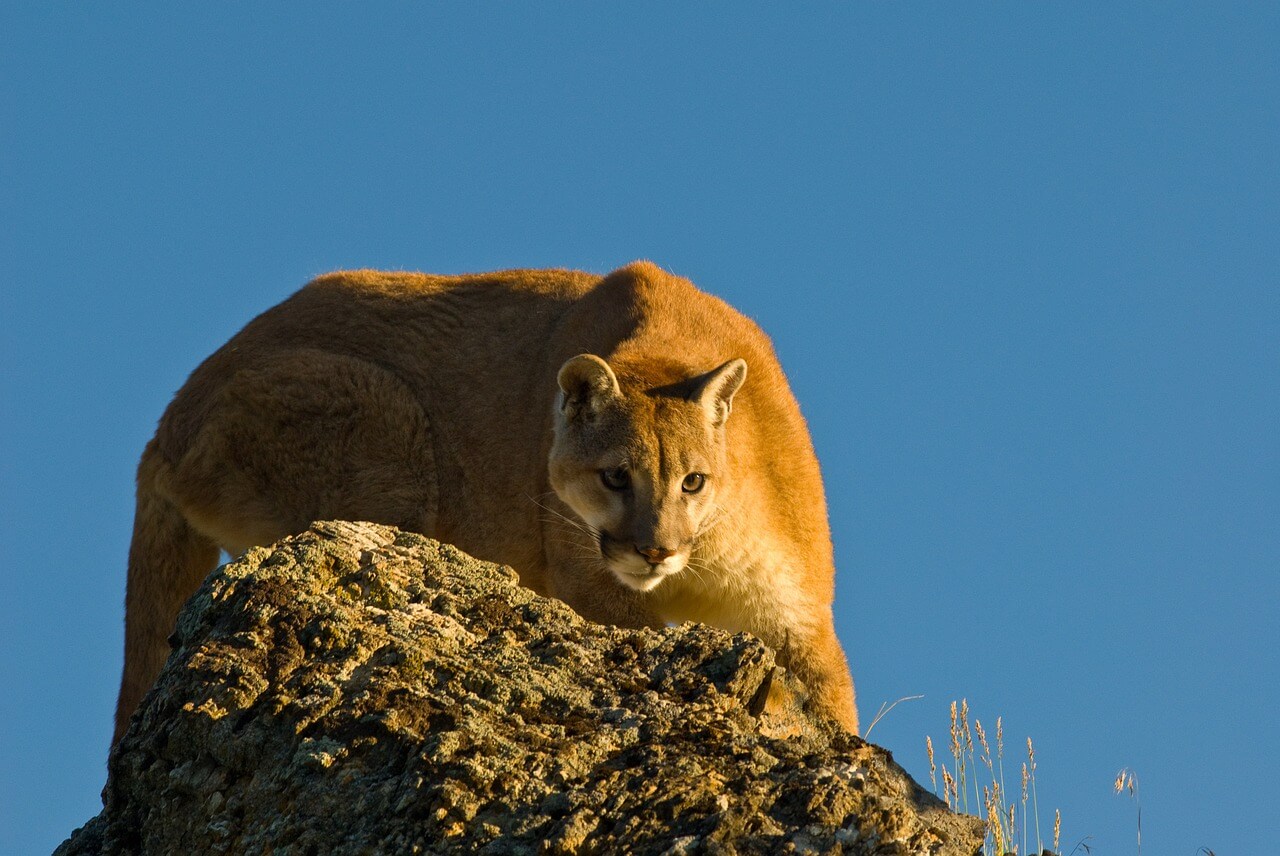Cougars are large cats who roam much of the western United States and Canada, as well as a small part of Florida. Despite their solitary nature, it’s not uncommon to see cougars out in the wild, or even on your own property. If you’re wondering what to do if you see a cougar, read on.
What You'll Learn Today
How Dangerous is a Cougar?

Cougars, also known as mountain lions, are a lot like other big cats; they are strong and powerful, and they have sharp claws and teeth.
They are generally more dangerous to other animals than they are to humans, but it’s important to remain cautious anytime you may come in contact with a cougar.
Can a Cougar Kill a Human?
The short answer is yes.
Cougar attacks on humans are rare, but they do happen from time to time. Anytime a cougar attacks a human, there is a chance the attack will be fatal.
Cougars are more likely to stalk and hunt wildlife, livestock, or pets; they generally leave humans alone. So if a cougar attacks a human, there are several factors that may contribute to the attack, such as:
- Starvation: If a cougar is driven to attack a human, it may be because food is scarce and they are becoming desperate. A cougar that’s hungry and malnourished will hunt just about anything.
- Defense: Like many other animals, cougars may attack if they sense a threat to themselves or their young. While they don’t generally see humans as threats, cougars can be unpredictable, so it’s important to be wary of the potential for an attack.
- Instinct: A cougar’s hunting instincts may be triggered if they see someone running or riding a bike. Especially if the cougar is hungry, it may not recognize the difference between a fast moving human and, say, a sprinting deer.
What Does a Cougar Footprint Look Like?
When you’re out hiking in cougar country, it’s important to watch for signs that a cougar may be near. One of the signs to look for is cougar footprints in the mud.
Obviously, it’s important to be able to identify a cougar footprint and tell it apart from other footprints you may encounter. So, what does a cougar footprint look like?
A defining characteristic of cougar footprints is that they usually don’t have claw marks. Cougars’ claws are retractable, and their claws are almost always retracted while they walk.
According to Wildlife Illinois, cougar footprints are 3 ½ inches wide by 3 inches high. They are composed of four toe marks and a heel mark.
The toes will be rounded and at uneven heights around the heel. The heel will have two distinct lobes at the top and three at the bottom.
The following video will give you a great visual and description of a cougar track.
How Do You Scare Away a Cougar?
If you live in areas where cougars are prevalent, you may occasionally find them wandering onto your property.
But even the occasional cougar sighting can be a big problem if you have pets or livestock, and you certainly don’t want the big cats coming around while your kids are playing outside. What are some good ways to keep them off your property?
And how do you scare them away if they do show up?
Avoid Attracting Cougar Prey
Do you have a lot of deer, racoons, coyotes, or other wildlife hanging around your property? Cougars feed on these and other wild animals, so it’s possible that the first step of getting rid of cougars is getting rid of their prey.
Keeping the wildlife away may be easier said than done, but there are a few things you can do. Avoid putting out food for the wildlife, secure trash receptacles, and keep gardens and orchards secured behind fencing or netting if possible.
Make a Lot of Noise
Like many other animals, cougars aren’t a fan of loud noises.
To scare cougars off your property, you could have timed or motion sensor alarms installed. These alarm systems will go off either at set times or anytime motion is detected and will scare off various forms of wildlife.
If you’re out hiking, it’s a good idea to have bells, bike horns, whistles, or anything else that you can use to make noise should you encounter a cougar.
Use Bright Lights
Sudden, bright lights can have a similar effect as loud noises, especially at night. If you’re worried about cougars coming onto your property and hunting at night, it might help to install motion sensor flood lights throughout the area.
If you’re hiking, especially near dusk or after dark, use a high-beam flashlight to keep the cougars at a distance.
Hike in a Group
Anytime you go hiking in areas where cougars are common, go in a group. Cougars are more likely to attack solo hikers, but they will usually leave you alone if you are surrounded by other people.
What’s more, if a cougar does attack, there will be other people besides yourself to chase the cat away and call for help.
What to Do If A Cougar Attacks You?

So, what if the worst does happen? If you’re wondering how to survive a cougar attack, the following tips may just save your life someday.
Don’t Panic
In any dangerous situation, panic is your greatest enemy. Encountering a cougar will require you to be able to think clearly and act deliberately.
If you see a cougar, do not run away. Stay calm and slowly back out of the area.
Even if the cougar attacks, it’s important to hold your ground–don’t run away. Maintain eye contact and don’t give into any fear you may be feeling.
If you’re with children, hold their hands or pick them up to keep them from running off. Cougars tend to target children more than adults, so make sure to keep children calm and close to you.
Be Loud
As noted above, cougars don’t like loud noises. If you are attacked, use anything you can to make noise–a whistle, a horn, a stick on a metal water bottle.
If you have nothing within reach to make noise, use yourself. Yell and shout, clap your hands, stamp your feet–whatever it takes.
Fight Back
Finally, if nothing you do deters the cougar, then fight back. Kick the cougar, throw punches, try to keep its mouth and claws away from your head and vital organs.
You may not think you have much of a chance against a cougar, but in cases of attack, you have a better chance of surviving if you fight than if you run away.
Conclusion
Cougars (known also as pumas or mountain lions) don’t often attack humans, but when they do, the attack can be deadly.
Fortunately, there are several things you can do to keep cougars away, whether you see them in your yard or while you’re out hiking.
It is easier said than done. I believe most people will run when they see a cougar or any similar animals.
Good information!. I will educate my family about these good pointers. We live in Tappahannock VA. Someone saw what appeared to be a cougar here in our area.
Thank you
We lived in a mountain foot hill community and hiked the same trails the cougars hunted. We learned to click rocks as we hiked. And though we walked the same trails
we did not see one until one cold night the mom mountain lion followed us home and
asked if she might have my older small dog for her cub or if I had other food for her.
We just happened to be out of any meat that night and the stores were closed. She was standing within three feet of us and had a feeling for us. I told her I was sorry I loved my pet though she was becoming infirm, and I was fresh out of meat so she have to find dinner elsewhere so she calmly walked down the hill with her baby.. I would say if you treat wildlife with mutual respect they will learn to trust us the same way. Who knows how I’d feel under other circumstances.